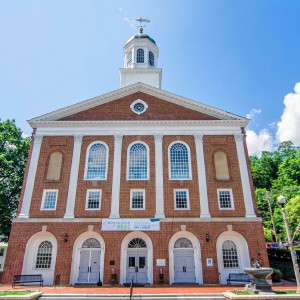Housing advocates cite key bills
| Published: 05-18-2023 12:00 PM |
More than 50 bills are being watched by housing advocates and policy experts in Concord this year that could affect funding for programs, tenants’ rights, incentives to municipalities and other services relating to affordable housing and homelessness issues.
Elissa Margolin, director of Housing Action NH (HANH), a statewide coalition of 80 organizations united around affordable housing policy and ending homelessness in NH, says HANH has identified several bills this year that are priorities.
The Housing Champions Bill
Senate Bill 145 would establish a voluntary Housing Champions Designation Program that would create incentives for municipalities and be administered by the NH Department of Business and Economic Affairs (BEA). The program would provide recognition, technical assistance and grants to municipalities that are ready to respond to the need for more affordable housing, Margolin says.
“It’s a carrot-based approach to try to meet municipalities where they’re at and to say, ‘what do you need in order to accommodate more density or affordable housing options; how can we work with you on local zoning reform?’” Margolin said.
State Sen. Rebecca Perkins spoke on behalf of SB 145 at a Senate Commerce hearing on Feb. 14. “This bill is relatively simple…[It] is the product of bipartisan work and one that can empower the growth of workforce and affordable housing while respecting local control,” she said at the hearing, adding that New Hampshire is facing a workforce and affordable housing crisis. “Vacancy rates stand at 0.5% and we are short at least 20,000 units across the state.”
Municipalities would be accepted into the program based on a commitment to policies that promote workforce housing, Perkins says. “Pro-housing policies include zoning ordinances that promote workforce housing development, improvements to sewer and water infrastructure, and building out sidewalks and public transportation.”
Ben Frost, deputy executive director and chief legal officer for the NH Housing Finance Authority (NHHFA), says SB 145 would create a fund at the BEA to provide grants to municipalities to achieve a housing champions designation. Once designated, municipalities would become eligible for two pots of discretionary funding. “There is another $3 million for communities in the bill designated as housing champions to be recognized for help with newly constructed workforce housing to proceed,” he says, adding that other grants and loans would be available for sewage and drinking water, issuance of building permits, new construction and telecommunications, totaling $25 million in state funds.
Article continues after...
Yesterday's Most Read Articles
 ConVal officials propose one athletic director position
ConVal officials propose one athletic director position
 Sixteen-unit development draws ire from neighbors in Jaffrey
Sixteen-unit development draws ire from neighbors in Jaffrey
 UPDATE: Drivers identified in Jaffrey dump truck crash
UPDATE: Drivers identified in Jaffrey dump truck crash
 Mary Lawler remembered for a life of service
Mary Lawler remembered for a life of service
 Scott Bakula starring in Peterborough Players’ ‘Man of La Mancha’
Scott Bakula starring in Peterborough Players’ ‘Man of La Mancha’
 Spellers strut their stuff at inaugural Greenfield Spelling Bee
Spellers strut their stuff at inaugural Greenfield Spelling Bee
With more people retiring and buying second homes in New Hampshire, Frost says the need for more affordable housing is projected to grow. NHHFA recently published its statewide housing needs assessment, which shows the state has a current shortage of about 23,000 affordable units which, if filled, would bring the vacancy rate to 2%. Looking to the future through 2040, NHHFA estimates 85,000 units will be needed to achieve a balanced market and future growth, Frost says. “This doesn’t account for short-term rentals and vacation homes. That would be 100,000 over next 20 years with the bulk of need in the first decade.”
Advocates say HB 117 could lead to more evictions
House Bill 117 would allow a landlord to evict a tenant at the expiration of the lease or tenancy if the term is longer than six months. The bill also requires the landlord to give 30 days’ notice. In a letter to Bob Lynn, chairman of the House Judiciary Committee and sponsor of the bill, Margolin states, “many ‘good’ tenants will suffer displacement if this bill becomes law.”
“[House Bill 117] could lead to more evictions. There’s an established Supreme Court precedent in New Hampshire that says the end of your lease agreement is not grounds for eviction. Chairman Lynn’s bill would overturn that precedent and say at the end of the lease, a landlord can evict a tenant,” Margolin says, explaining that the bill’s timing is especially poor due to the housing shortage in the state. Simply forgetting to sign a lease, she continues, could give the landlord a right to evict.
“Proponents argue that it will make landlords and tenants more diligent to renew contracts or renew terms. [But] this bill is just going to end up hurting the vulnerable, including the elderly and disabled.”
Senate Bill 231-- shelter programs and affordable housing
Senate Bill 231, which Margolin says is a big priority for HANH, establishes a historic housing tax credit allowing for a 20% investment tax credit for rehabilitating historic buildings, placing them in service as income producing buildings. It also provides $10 million to the NH Department of Health and Human Services to support shelter programs, housing stabilization services and eviction prevention.
Lastly, this bill sends $25 million to the affordable housing fund and $30 million to the Division of Economic Development to accelerate the approval of affordable workforce housing.
Frost says SB 231 provides $5 million annually in tax credits and would be administered by NHHFA. “A hearing was held [in February], and there was no opposition. [There are] good signs there.”
The $25 million for the affordable housing fund would be used as gap filler on capital improvement projects, Frost says, a move the Legislature previously executed in 2020.
Stephanie Savard, formerly the director of the NH Coalition to End Homelessness and director of Families in Transition, says the money for shelters, eviction prevention and housing stabilization services in SB 231 could provide breathing room, allowing shelters to enact their best practices.
“[Shelter providers] do it now, but it’s hard without the funding,” she says. “We don’t know what will happen when [the bill] goes before the House. It’s Republican-sponsored, and so far it looks good.”
Regarding affordable housing incentives, Frost says RSA 79-E, the Community Revitalization Tax Incentive program, already used by about 70 towns and cities across the state, allows tax relief for projects on older buildings and has been used for affordable housing. “The Legislature [also] adopted a new provision within 79-E that allows for new construction on a case-by-case basis,” he says. “This is a great incentive.”
House Bill 110 would reimburse municipalities for services
While a lack of shelter space is an issue that housing advocates have identified as a problem in the state, Berlin Mayor Paul Greenier says building a shelter in his city could present problems. “One big problem with building a shelter is that if you build it, they will come, and they will come from everywhere,” he says, citing an example in December of a homeless woman being sent from Sanford, Maine, to Manchester. “If you site a 50-bed shelter in Berlin, guess what? I’m going to get every chronic homeless person [from Groveton and Colebrook] coming here. There’s a NIMBY issue with homelessness.”
House Bill 110 could alleviate some of Greenier’s concerns. In late February, the NH Senate Committee on Election Law and Municipal Affairs heard testimony on the bill, which addresses the topic of municipal fiscal responsibility for individuals seeking emergency shelter, hospital or treatment programs. If passed, the bill would ensure that any individual seeking those services does not lose their residency because they seek those services in another community, and municipalities providing services would be entitled to reimbursement from the aid seeker’s municipality of origin.
One bill that public planning and housing advocates were hoping to pass this year was HB 44. The bill would have required cities and towns to allow four residential dwelling units on any single-family lot served by municipal water and sewer. This could be a four-unit building, two duplexes, four single units or four townhouses. Despite supporters’ arguments that by allowing more density towns and cities could help alleviate the affordable and workforce housing shortage, the bill was killed 209-141.
These articles are being shared by partners in The Granite State News Collaborative. For more information visit collaborativenh.org.

 Voters will soon make their choices
Voters will soon make their choices
